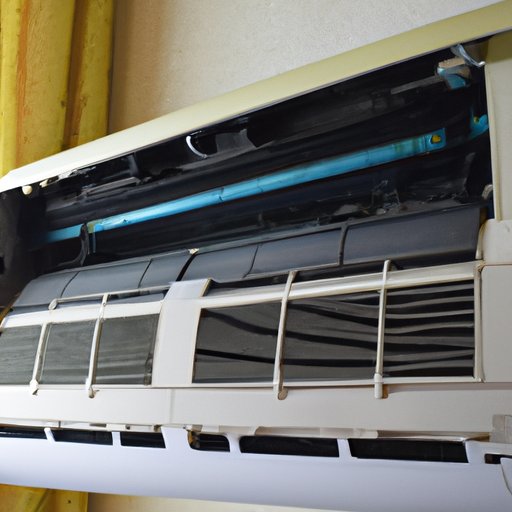I. Introduction
If you’ve ever noticed an unpleasant odor coming from your air conditioner, you’re not alone. This common problem can be caused by a variety of factors, from mold and mildew to dirty filters. In this article, we’ll explore the root causes of air conditioner odor and offer solutions for resolving this issue.
II. Investigating the Root Causes of Air Conditioner Odor
The most common source of air conditioner odor is mold and mildew growth within the unit. This can be caused by excess moisture in the air or a dirty air filter, both of which can create the perfect environment for mold and mildew to thrive.
Dirty filters can also trap other types of debris, such as pet hair and dust, which can produce an unpleasant smell when blown out of the air conditioner. Additionally, a buildup of dust and debris can cause issues with the unit’s evaporator coil, which can also lead to an odor.
It’s important to identify the specific cause of the odor in order to effectively eliminate it. If the source of the odor is mold or mildew, it’s important to address the root cause of the excess moisture in the air, such as humidity or a leaking AC unit.
III. How to Eliminate Air Conditioner Odor Without a Technician
If you’re experiencing a funky smell coming from your air conditioner, there are steps you can take to clean and disinfect it without calling in a professional. First, turn off the power to the unit to avoid injury. Next, remove and clean or replace the air filter. Then, use a specialized AC coil cleaner to clean the evaporator coil and any other dirty components.
After cleaning, make sure to let the unit dry completely before turning it back on. To prevent odors from returning, consider using a dehumidifier in the room with the AC unit, as excess moisture is a common cause of musty smells.
It’s important to take note of any warning labels on cleaning products and follow safety protocols, such as wearing gloves and masks, to avoid breathing in dangerous fumes.
IV. The Impact of Using Air Fresheners in Your Air Conditioner
Using air fresheners in your air conditioner may seem like a quick fix for unpleasant smells, but it could potentially cause more harm than good. Many air fresheners contain chemicals that can lead to respiratory problems or even damage the AC components over time.
Instead, consider using natural alternatives, such as essential oil diffusers or baking soda, to freshen the air in your home. If you’re set on using an air freshener, look for natural and non-toxic options specifically labeled as safe for air conditioning units.
V. How to Maintain Your Air Conditioner to Avoid Unpleasant Smells
One of the best ways to avoid unpleasant smells from your air conditioner is to maintain it regularly. This includes cleaning or changing filters at least once a month, regularly checking for leaks or damaged parts, and ensuring proper ventilation in the room where the AC unit is located.
To prevent mold and mildew growth in the AC unit, make sure the humidity levels in the room are kept low and consider using a dehumidifier if necessary. If you live in a particularly humid climate, it may be necessary to have your AC unit serviced more frequently to prevent mold growth.

VI. Understanding the Various Types of Air Conditioner Smells
When it comes to air conditioner odors, not all smells are created equal. In fact, different types of smells can indicate different underlying issues with your AC unit.
Musty odors are usually caused by mold or mildew growth, while burnt smells may indicate an overheating motor or other electrical problem. Chemical smells can be caused by coolant leaks or problems with the refrigerant.
If you’re experiencing an odor from your AC unit, try to identify the type of smell and use that information to determine the best course of action.
VII. Why Preventative Maintenance is Necessary for Your Air Conditioner
To avoid major repairs and extend the life of your AC unit, it’s important to schedule routine preventive maintenance visits with a licensed professional. Not only can regular maintenance help identify and resolve potential issues before they become major problems, but it can also help prevent common air conditioner odors caused by dirty filters or excess moisture in the air.
VIII. Conclusion
Air conditioner odor can be a frustrating problem, but with the right information and preventative measures, it’s possible to keep your AC unit smelling fresh and working efficiently. By identifying the root cause of the odor and taking steps to maintain your AC unit, you can enjoy cool, clean air all summer long.
If you’re still experiencing air conditioner odor problems despite taking these steps, consider calling in a licensed professional to assess the issue and offer a solution.
